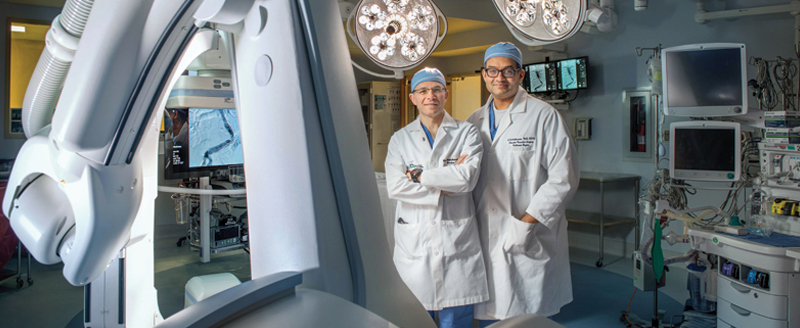Cardiac and Vascular Surgeons Team Up to Treat Complex Aortic Pathologies at MedStar Union Memorial Hospital
2017 Spring/Summer

Cardiac Surgeon Reza Abrishamchian, MD (left), and Vascular Surgeon Raghuveer Vallabhaneni, MD
MedStar’s highly effective interdisciplinary program to treat complex aortic disease, originally based at MedStar Washington Hospital Center, is expanding. Now, patients can also rely on the aortic team at MedStar Union Memorial Hospital, where vascular surgeon Raghuveer Vallabhaneni, MD, and cardiac surgeon Reza Abrishamchian, MD, are successfully collaborating to treat these challenging conditions.
The surgeons work together, caring for patients from the initial diagnostic appointment, through surgery, to recovery and rehabilitation. “Care of these patients is complicated and so are the procedures for treatment,” says Dr. Vallabhaneni, who is director of Vascular Surgery for the Baltimore region. “Combining a cardiac and a vascular surgeons’ expertise as we evaluate each patient and develop a treatment plan means we can offer the best chance for a good outcome to our patients.”
Treatment options for patients with aortic pathology— which includes tears in the wall of the aorta (dissections); aneurysms of the aorta in the chest, abdomen or both; and other conditions—have been transformed as minimally invasive endovascular surgical procedures have evolved.
“For some patients requiring surgery, open repair procedures are the best option,” says Dr. Vallabhaneni. “But for most, endovascular options, such as stent graft repair for a thoracoabdominal aortic aneurysm, may be performed through a small incision under the collar bone and two small needle holes in the groin. We have seen patients in their 80s, who could not have tolerated the open procedure, have good outcomes and maintain their quality of life. We are now able to treat more than 90 percent of even the most complex pathologies in a minimally invasive fashion.”
The surgeons perform both open and endovascular procedures in a hybrid operating room, with sophisticated imaging that provides the level of precise detail necessary for the complex surgeries. Dr. Abrishamchian believes that medical practice is shifting from a specialty-centric, siloed approach to one that is more inclusive and collaborative. “Many specialties can become involved in successfully treating complex aortic pathology—cardiac surgeons, vascular surgeons, critical care physicians, anesthesiologists, pulmonologists, nephrologists, and of course a range of other caregivers,” he says. “This collaborative, unified approach to health care is vital for patients with multiple conditions, and in all phases of their care.”
MedStar Union Memorial’s complex aortic program also offers the full resources of MedStar Heart & Vascular Institute, including regional transport, image sharing, dedicated cardiovascular ICU and 24/7 on-call team. “We’re able to offer services previously only available at large academic centers,” notes Dr. Vallabhaneni. “That is satisfying for us, and life-changing for our patients.”
“This kind of collaboration,” says Stuart F. Seides, MD, MHVI Physician Executive Director, “is representative of the continuing evolution of Union Memorial as a premier cardiovascular center.” For consultation, contact: Dr. Vallabhaneni at 410-554-2950 or Raghuveer.Vallabhaneni@medstar.net, or Dr. Abrishamchian at 410-554-6550 or Ahmad.R.Abrishamchian@medstar.net









